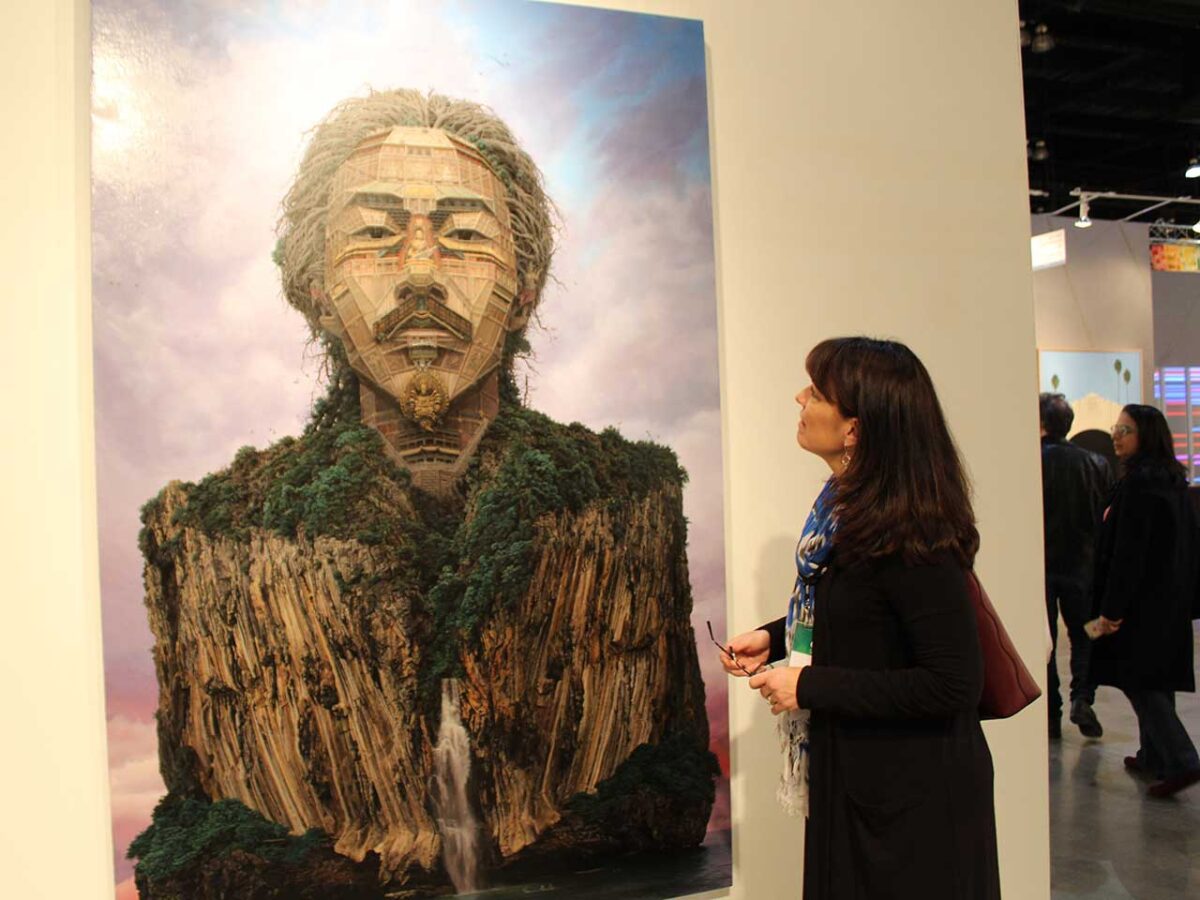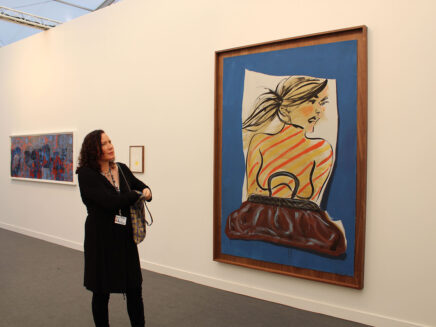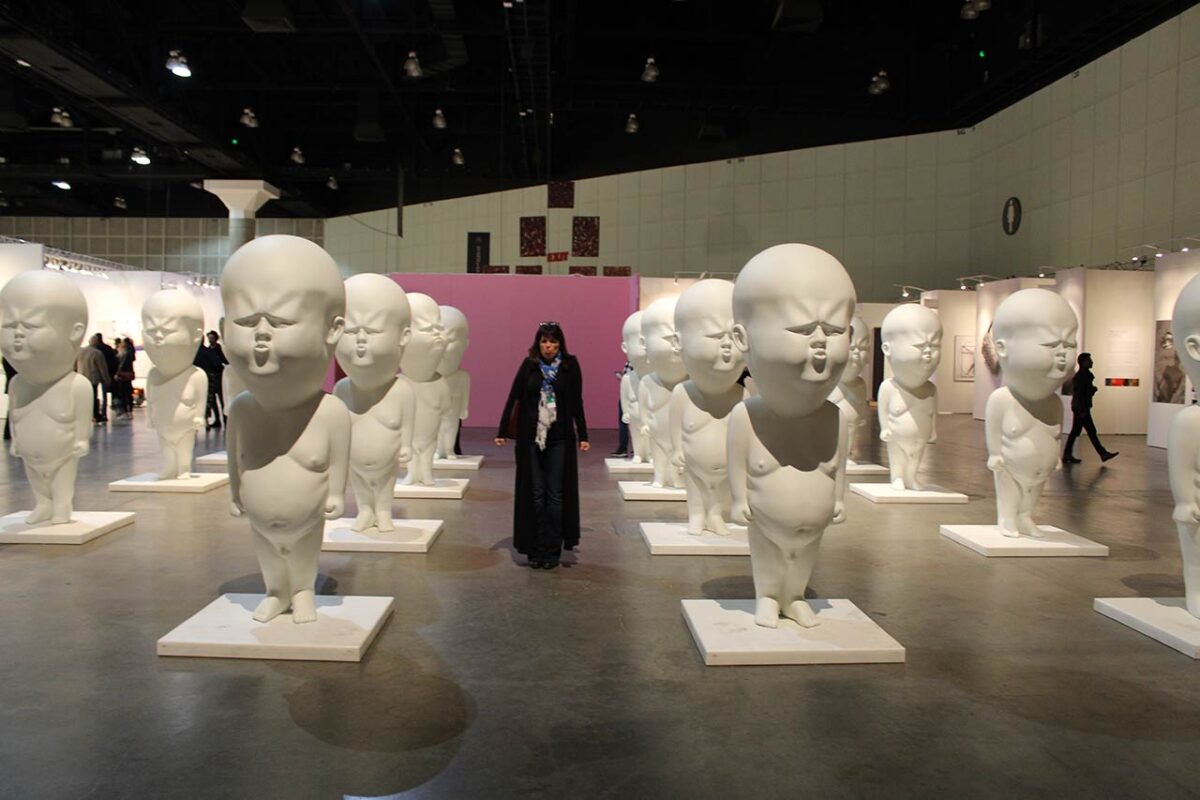photo by Eric Fischer
The first comic I selected to complete our acrostic interview, Alex Powers, recommended Diana Dinerman to me, and for good reason. She’s certainly one to keep an eye on as a Los Angeles-based performer whose one woman show – Detour – is crossing the pond to Edinburgh, Scotland this summer.
T
Natalie Durkin (TribeLA Magazine): Give yourself and your work a tagline and tell us why.
Diana Dinerman: Sophisticated feminist who might cut you. I’ll go to great lengths for peace.
That’s how someone else described me once and, she was a woman, so, I trust it.
R
ND: What got you started in comedy? What is the reason you are here today?
DD: I was born a poor, black lesbian. As you can see, things have changed…
The timing of this question is serendipitous because I just wrote a one woman show about how I became a comedian, called Detour. I’ll give you the gist.
I was in the writing phase of my PhD – I was a Los Angeles cultural historian, which was the reason I moved here – and I was suffering. It wasn’t the usual suffering; everyone who does a PhD suffers, but this was a kind of deep psychic pain that I couldn’t name.
I thought I had severe writer’s block and I needed to think in a different way, so I took a short comedy class thinking it would unstick me so I could finish my historical tome and get on with a teaching and research career.
I did unstick myself, but I decided to change my entire career! Turns out, I had a life block. I was writing in the wrong genre for the wrong audience. When I started writing jokes, something inside me woke up. I realized I had a lot to say and none of it was about American History. I thought, if I am going to struggle with instability and workload, I should be having a better time while I’m doing it, or at least like what was on the other side of the effort.
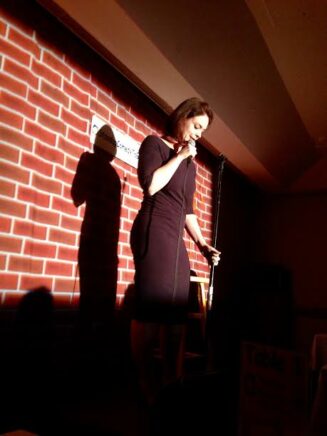
photo by Deborah Miller
So, I went back to being a performer. I say I went back because I was trained as an actor and a dancer before I quit in my 20s. Years later, I came back to the stage as a different person. Someone with years of experience and a point of view. I had something to say, so I started saying things and those things were funny.
I read Seth Godin’s The Dip, which is a book for business owners about when to quit and when to persevere. I underlined many passages in it, such as there’s no reason to continue investing in something unless it’s going to get better. And, if the best you can do is cope, you’re better off quitting. I realized I was doing more coping than growing, and that being an academic was a compromise instead of a vision. And it wasn’t going to get better. On paper, it made sense for me. But, the experience of Academia, the isolation and the narrowness of the lifestyle, fell short of the feeling I wanted to have. Or, I could say, I grew out of wanting that isolation and narrowness because, for a time, it suited me.
I stopped writing my dissertation and took five months to focus on creative writing. I became very curious about myself during that time. I was asking a lot of questions about my life and how I got where I was. I started writing in my own voice and in different forms: essay, joke, screenplay, lists. I’d never even tried to write a screenplay before, but I learned. This was a very generative time for me because I let myself be bad at it. That’s the only way to get good at anything: let yourself be bad at it for a while.
I have an inner voice that’s always been very loud. As soon as I got a taste of my own voice and writing in a way that expressed my personal experience – meaning it was observational rather than argumentative – that voice said: “There’s something here. Keep going.” I did what it said. I’m here today because I listened.
I
ND: How do you hope to influence your audience?
DD: I hope they feel more connected at the end of my shows. Laughing or thinking about something in a new way has an opening effect.
Whether it’s being irreverent about something we’ve been taught to admire – like marriage – or making a connection between two things that don’t seem related – like death and romance – I like to make connections between things that don’t seem connected on the surface.
That’s what comedy is: connection.
I want to open people up so they can grow. Everyone has a protective shell around their tender spots – ideas about themselves or the world that they’re attached to. Those tender spots want connection and they want to be challenged.
A laugh always cracks the outer shell. A laugh is often the fastest way to get close to another person.
B
ND: What do you do when your creativity is blocked?
DD: I think of “blocks” as a form of disconnection so, when I’m feeling that way, I do something to get connected.
One: I read other people’s work. Nothing unsticks me faster than reading (or going to see) great stuff.
Two: I move my body.
E
ND: What fires you up and gives you energy?
DD: Great writing. Cute animals. Decent humans who love me – too earnest? Well, when someone gets you, it’s very energizing.
I’m an ethical hedonist, so I want the most amount of pleasure with the least amount of harm.
L
ND: Can you tell us a little known fact?
DD: Modern Dance has deep roots in Los Angeles. In 1948, there was a dance theater on Melrose Avenue, called the Lester Horton Dance Theater, that was the first and only theater in America devoted to dance performance. It was interracial and queer, and taught all aspects of performing arts production. It was an enormous part of post-war culture in Los Angeles and influenced a slew of artists who changed American Dance Theater.
This was my dissertation topic so, thanks, now I don’t have to finish it.
A
ND: Where is your favorite place in Los Angeles and why?
DD: The Silverlake Reservoir. Walking that loop has been a mainstay of comfort for me since I moved here. I sublet a bungalow around the corner my first summer here and it seduced me into moving permanently. Every time I walk it, I am reminded of why I came here: the lush surroundings, the way the houses nest inside the hills, the view that combines desert, mountain, and meadow.
That’s Los Angeles to me: expansive landscape, unpredictable growth, unevenness. It’s a combination of high and low. That’s LA.
C
ND: Where is your favorite comedy club to perform?
DD: I don’t have favorites ‘cause I’m not nine years old. If I have to choose a club, it’s the DC Improv.
O
ND: Do you engage in other art forms? What mediums of art inspire you?
DD: I was a dancer and a singer before I was a comedian so I’m an ol’ stage whore at heart.
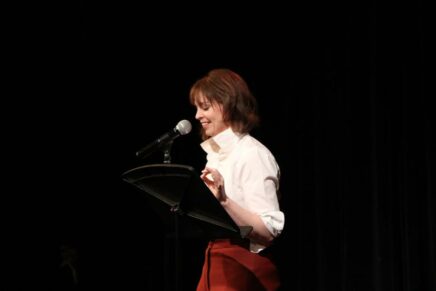
photo by Alicia Carroll
As a writer, I identify as an essayist because my nonfiction is plotless and I prefer it.
I write in other genres, but my nonfiction is always very internal – a mix of funny and sad and never one or the other, which I think is naturally comedic.
I wish I had a talent for painting or something that you could put your hands on: something you can look at more than once. When you’re a performer, what you make disappears. It keeps you searching. It’s frustrating and motivating because you have to keep chasing that feeling. We’re all chasing a feeling…
I am inspired by art that’s good, meaning it has an expanding effect on the performer and the audience. I’m not picky about the genre. Anyone who can generate an experience with their voice and body is inspiring to me.
M
ND: How do you make comedy? Briefly chronicle your creative process.
DD: Comedians have big feelings about small things and small feelings about big things. As a population, we’re highly bothered. My work is mostly about what bothers me.
My creative process relies on observation and introspection. I call myself a professional noticer, but I’m not as interested in the external as much as the internal. As a writer and a performer, I go for the interiors. And my work is for people who want growth reflected back to them.
I don’t know that I have a process for writing aside from getting my butt in a chair and writing until I bump into something good. The secret to developing your writing is putting your butt in the chair, really.
I write down my observations and feelings all day; I use my phone notes a lot. Then, I free write on them until I land on the funny.
I usually also have an audience member in mind when I write jokes or prose. I’m thinking of a particular person I want to communicate something to. That helps me clarify what I’m trying to say: identify who I’m saying it to.
My creativity is dependent on interaction with others, which is hard when you’re an introvert. Being around other funny people is like getting an injection of creative seedlings. Not all the seeds grow into comedy, but usually something extraordinary comes out of you when you’re around the right people: something you could’ve never conjured on your own.
So, my creative process is: butt in a chair and other people.
It’s not magical.
I
ND: What is the best advice you’ve received and the best advice you can impart onto us?
DD: Advice from others usually misses the mark because it’s almost always filtered through their own disappointments. I haven’t received much good advice in my life, aside from wear sunscreen every day. That was from my mother and it was more of a directive.
But, I’ll say this: If you’re unsure about where your life is going, don’t think about what you want to do. Think about the feeling you want to have. Do the things that give you that feeling. Follow the feeling, not the accolades.
C
ND: Any closing words?
DD: It took me a long time to learn this, but you don’t have to have it all figured out. Everyone is over planning. Over strategizing and working too hard to crack a code that doesn’t exist.
I could’ve never predicted the direction my life would take and that’s been a revelation and a relief. What a relief to know that I don’t have to figure it out and there are possibilities I can’t even see.
To become a comedian and a writer after a couple other careers and have a one woman show that’s going to Edinburgh this summer – it’s been a beautiful, messy surprise – like childbirth.
It’s the questions that got me here so if there’s something I can leave you with:
it’s that curiosity will get your farther than certainty.
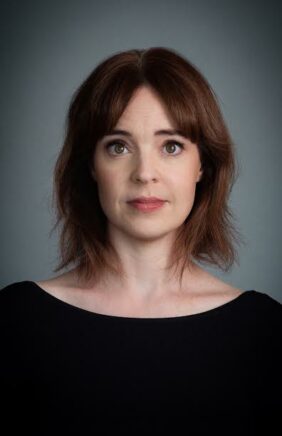
photo by Mandee Johnson
more Diana Dinerman

